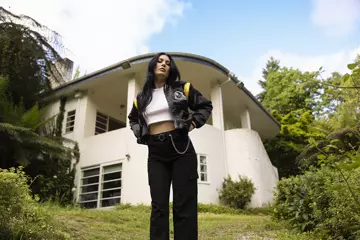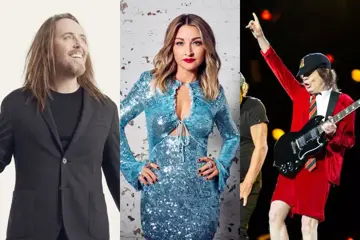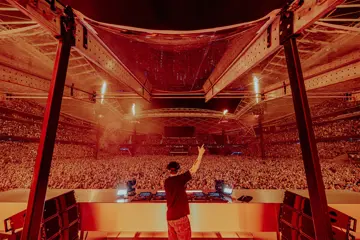“When I was younger, actually before I even wrote songs, I was into electronic music, and I just made these very vast arrangements of just everything I could imagine,” Winter People singer, songwriter, multi-instrumentalist and visual artist Dylan Baskind explains the genesis of his musical journey, “and then I put that aside totally and went to this absolute singer-songwriter type of world, and then there was a point, a few years ago, where I was, like, 'Okay, well how am I going to make these two ways of approaching music and songs come together?' And there were a huge number of failures but I suppose through all those years of failing I got a grasp of how to take something from a guitar or something that's very much a seedling and grow that without losing sight of the intention of the song.”
And then he found two violinists who could sing, and a rhythm section that could also sing, that allowed him to recreate those vast soundscapes and arrangements without having to resort to the computer and electronics. Enter the six-piece Winter People, and with them, he's been able to translate those ideas and grow those seedlings into a remarkable debut album, A Year At Sea.
“It's come up a lot, but I've been quite militant about not resorting to the computer. I hope that's not dogmatic, but I do feel that there is just something about watching a live band, when there is something recorded, that I just find takes away from what you're seeing. I want to know that everything that's being played is the product of what people are doing in the moment. Sometimes [the computer] does actually limit your capabilities.
“Luckily, when the band got started, I'd made an album by myself that was fully orchestrated, so it wasn't like we all got in a room and we had nothing to work from; we had a kind of architecture to build on and to work out what everyone's role was going to be and where people's strengths were going to lie. And the good thing about starting the band, for me I just wanted to have a band – there was no more ambition beyond that – so there was a lot of time, months and months and months, which you don't get once you actually play your first show. We had a long sort of incubation/gestation period where we had these songs to work from already, we had orchestrations that existed, from that previous album, so we could learn to play as a unit.”
Don't miss a beat with our FREE daily newsletter
What these six musicians learned to do together stretches from pastoral a cappella harmonies to sweeping string arrangements, warm acoustic sounds to vast orchestral soundscapes. The first hint of the possibilities inherent in their music came in the form of a debut EP, the single from which, Gallons, garnered plenty of radio love. But there was one more element needed – the right producer – and that came in the form of American producer, Peter Katis, whose CV includes working on records by Interpol, The National and Frightened Rabbit.
“I'm a technical/audio person – I did all the mixing for our first EP – but the primary thing I listen to is the song, and very much the lyrics; that tends to be what I focus on first. And this was the only, the tracks that Peter Katis produced, the first time in my life I'd ever said that, despite and independent of the songs, I enjoy the way they just sound. I knew the way things sounded added to what was the songs, and they help to keep that in the best format possible, but I'd never just said to myself, like, despite everything else, the actual sound of this really appeals to me.
“So in my dream box, well I love this guy's work and I was always trawling the Internet trying to find his little posts on audio forums to see how he did parallel compression et cetera. Anyway, our manager, when we talked to him about the record, was, like, 'Well, who would ideally want to do some mixing?' And I said this guy Peter Katis but we're not going to worry about that because it's not going to happen, it's fine. But I thought to myself – I don't know if this was a large helping of ego – but I felt he just listened, you'd get some kind of response, and to me, had I got a response from Peter Katis that said, 'How ya doin', really like it, I'm too busy, good luck,' I probably would have been really happy.
“But I wrote him this letter – my thinking was that if I expressed to him what the band was about and what I feel what his aesthetic sonically is about, and why I felt there was a resonance there, in middle case scenario, he would at least listen to the music. So I thought I'll send him this letter, it's likely that he will listen. So I did and sent it off and didn't hear from him for many months, and then we just got this message saying, 'Hey, really like what you're doing, let's see if we can work together.' Which to me was a huge validation I guess. Unfortunately his schedule, the project he was working kind of went over time so he could only do these two tracks; I love what he did, and nothing about the process disappointed me.”
So the tracks Gallons and Wishingbone, both of which have been released as singles, got the Katis mixing touch. The band then sent the rest of the tracks to various other mixing engineers with middling results until the tracks they sent to Rich Costey, whose credits include The Shins and Bloc Party among many, came back.
“Again, I was just surprised and delighted that the guy had even had time to write an email to say, 'This is good.' He had just one week, so I went to LA to try and do that with him and it was also amazing and a kind of serendipitous happening.”
As for those all-important lyrics, you have to wonder what was inspiring songs about Slaughterhouse Girls at the top of the world to The Antidote, again a very broad canvas to match the sounds.
“I guess for me, the thing that defines a song is mood. The music that appeals to me, as songs and literally as music – I love a lot of classical music – and the thing I love about particular types of music is they embody this very particular mood. So to me, I guess when I sit down to write a song, I know I've got a song when I've got some words and a mood. And whatever it takes, and that's why I feel I'm not discriminatory in my sounds because the thing for me is the mood and what's going to be a true evocation of the mood.”















